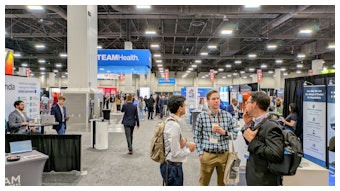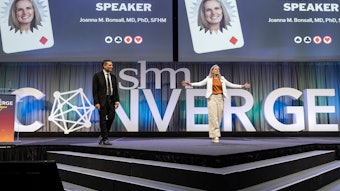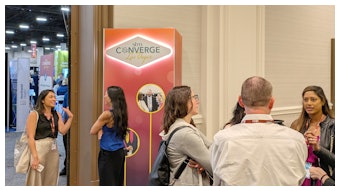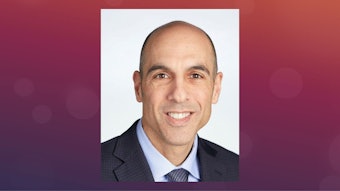Sip and savor the latest scientific research and innovation
This year’s Research and Innovations Scientific Abstracts Competition features even more cutting-edge science than last year.

Another year, another iteration of the Research and Innovations (RIV) Scientific Abstracts Competition. But that’s not to say there’s anything routine about the 2023 lineup. Of the 1,366 abstracts submitted, the judges accepted 942, an increase of more than 100 over last year.
Benji Mathews, MD, MBA, SFHM, chair of the competition and chair of hospital medicine at Regions Hospital at HealthPartners in St. Paul, Minnesota, said this year’s abstracts break down into the following categories:
- Research: 285
- Innovations: 137
- Vignettes: 520
The cutting-edge work from RIV abstract competition finalists will be on display Monday night alongside beverages and appetizers for those interested in both perusing the research and discussing it directly with the presenters.
“The research portion,” said Dr. Mathews, “highlights work done with sound methodology that has the potential to be applied regionally, nationally, and even internationally.” One plenary session in particular, he said, stands out.
“A Randomized Controlled Trial of Physician Rounding Styles” highlights work led by Marisha Burden, MD, SFHM. “The work showed some intriguing findings on a popular topic, including [the fact that] prioritizing discharging patients first did not result in earlier discharges or reduce length of stay.”
Another research session Dr. Mathews commended includes work by Dr. Rob Nathanson, titled “Development of a Chief Resident Medical Procedure Service: A 10-Year Experience.”
In the innovations domain, Dr. Mathews reports on work by James Hubley, DO, titled “Intervention to Enhance Post-Hospital Care for Patients Experiencing Unsheltered Homelessness.”
“The work with a five-element intensive bundle hopes to improve care for this underresourced population group, including metrics such as appointment adherence, trust in clinicians, readmissions, and length of stay,” Dr. Mathews said.
In the vignette category, he recommends you examine the work by Stephanie Moss, MD, titled, “An Elderly Zebra in Teenager’s Clothing: Wernicke’s Encephalopathy.”
Dr. Mathews himself has been part of the RIV program for more than a decade now.
“I began with submitting and sharing abstracts and posters as a resident and then early career hospitalist,” he said. “I then took the opportunity to serve as a volunteer judge and was tapped to help lead innovations.” It’s his third year as the overall RIV program chair.
“The influence of the program extends not only to me personally but beyond to build connections for the larger hospital medicine community. What I love about the posters, oral abstracts, and plenary sessions is that you’re seeing implications for the field of hospital medicine, not just via lessons from the past or current care model innovations — you’re seeing into the future.”
“I love that a clinician on one side of the country or globe can help provide case pearls and innovative and/or research ideas that can help care delivery for a patient on the other side of the world,” he said. And while he noted that aspects of the event are billed as a competition, the RIV session is not, at its heart, a competitive event.
“One of my goals as the chair is to support a collaborative atmosphere, where learners and experienced clinicians engage together.”
Visit SHM Meeting News Central for more coverage.











